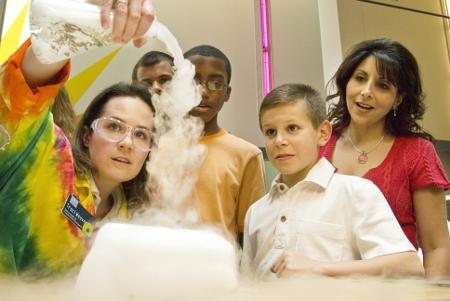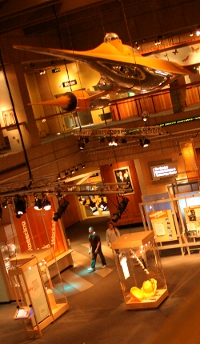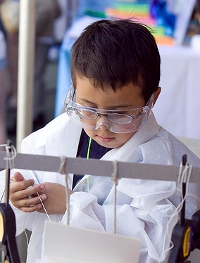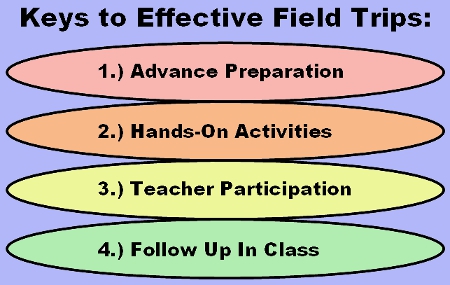Feature: Journey Into Science

Want to offer your students a hands-on science experience, but lack access to a well-equipped lab? Don’t despair. If you can find a science center within field-trip distance, you’re in business.
Across the country, science museums are working to provide the kind of interactive experiences that supplement and enliven classroom teaching. Take Columbus, Ohio’s Center of Science and Industry (COSI), for example, where students can learn about the properties and transitions of matter as they watch dry ice turn into a smoky gas (See picture, above).
Beyond such demonstrations, COSI offers summer camps, interactive online seminars with science professionals, grade-specific theme days, live science shows, and more than 300 interactive exhibits. For teachers, COSI offers professional development workshops, an annual Teacher Resource Fair, class materials, and discounts on admission and membership. The COSI on Wheels outreach program for K-6 graders introduces science topics to schools with interactive assembly presentations.
The museum specifically supports engineering learning through middle school girls’ and boys’ Discover… Engineering! programs, a Materials Science Day, and several engineering-themed camps. COSI’s science programming aims to get students “to think critically about issues, to make informed decisions, and solve challenges,” as well as to “influence and inspire innovation,” says Doug Buchanan, the education programs marketing manager.
 Boston’s Museum of Science, a nationwide leader in science and technology education since 1864, provides a host of exhibits, events, workshops, and class materials for its 1.5 million yearly visitors. The Educator Resource Center, where teachers are encouraged to review resources and join in professional development, is part of the museum’s plan to improve K-12 STEM literacy. The museum also provides field trips and tours, presentations, a planetarium, an IMAX and 3-D digital cinema, online class materials, and scholarships. The free high school science series allows students to meet with practicing scientists to discuss current science topics and career opportunities.
Boston’s Museum of Science, a nationwide leader in science and technology education since 1864, provides a host of exhibits, events, workshops, and class materials for its 1.5 million yearly visitors. The Educator Resource Center, where teachers are encouraged to review resources and join in professional development, is part of the museum’s plan to improve K-12 STEM literacy. The museum also provides field trips and tours, presentations, a planetarium, an IMAX and 3-D digital cinema, online class materials, and scholarships. The free high school science series allows students to meet with practicing scientists to discuss current science topics and career opportunities.
On the West Coast, the 155-year old California Academy of Sciences features a living green roof, an aquarium, a planetarium, and an indoor rainforest. It also offers teacher workshops and class materials on different science subjects; hosts field trips and tours; and provides daily programs, lectures, special events, internships and contests.
The Works, in Edina, Minn., is a small museum specializing in engineering, with a focus on elementary education. The museum’s “hands-on, minds-on” approach is accomplished through three large exhibit areas, special events, Saturday family activities, summer camps and classes, professional development for teachers, and online lesson plans. One room of the exhibit space is devoted to free-form building with foam bricks; another, to tinkering with a collection of gizmos, gears, pulleys, and machines. A third room offers an interactive assortment of imaging and optical technologies, where students can play a harp with laser “strings.”
The Works’ Excellence in Elementary Engineering Education conference, a professional development day in November, contains more than 20 breakout sessions on teaching elementary engineering.

The Massachusetts Institute of Technology Museum, in Cambridge, Mass., is a good example of university efforts to help develop K-12 STEM skills. Secondary school students and their teachers can take advantage of the museum’s exhibits, guided tours, workshops, special events, and contests, as well as opportunities to team up with scientists and MIT grads. Through the various programs, students can explore robotics, programming, structural engineering, geometry, DNA, video conferencing technology, and Rube Goldberg Machines.
The museum’s structural engineering workshop teaches students about tension and compression and implementing engineering design principles. In the robotics workshop, students explore computer programming and learn the history of artificial intelligence advances at MIT.
The museum’s annual Cambridge Science Festival showcases Cambridge as a STEM leader and provides exhibitions, contests, concerts, plays, lectures, debates, and workshops over a period of nine days at various locations.
“The overall goal of all of these programs is to inspire students,” says MIT Museum’s Director of Programs Robin Meisner, “about the possibilities and opportunities offered by science and technology.”
 Learning Science in Informal Environments: People, Places, and Pursuits (2009)
Learning Science in Informal Environments: People, Places, and Pursuits (2009)
Field trips can be a great part of a student’s learning experience. But, as this report from The National Academies Press suggests, some careful planning is needed to really make it count.
SPACE
Filed under: Special Features, Web Resources
Tags: Internet Resources, Museums, Science museum, Web Resources








